I’m on the train now, returning from the city of Alexandria back to the steamy capitol of Cairo. The train this time is air conditioned at least, unlike our ride up which felt like a sauna. Haitham had to give me some of his extra medication just to keep me from gasping like a fish out of water. It’s been two successful days in the Lighthouse City…although I didn’t get to see everything I wanted to I think I got pretty close.
Yesterday morning didn’t start off too well, though. Besides the nauseating ride from 6 til 9 AM to reach Alexandria in a train car that smelled too much like old fish, learning to understand Haitham’s apartment negotiation style with room managers was a trial in and of itself. Within minutes after our fishlike train pulled into the gaudy Alexandria Station, taxi drivers scented new blood and converged on us. Waving their arms in a way which they must have believed was “welcoming,” they began to undercut each other in their bid to both drive us and take us to their uncle Mohammad’s apartment tower which was conveniently located “with a sea view.”
Haitham’s advice to me for negotiating was “be quiet and let me do the talking,” which was similar to the Cairo strategy. The first taxi driver was a grizzled and bestubbled old sheikh who had the most incredible “R” rolls in his dialect that I’ve ever heard. It seemed that a machine gun was going off in our tiny black and yellow Peugot every time he opened his mouth. Haitham was completely calm and collected, and agreed to visit the apartment buildings our driver conveniently happened to know of. The first one he showed us had interesting wallpaper and carpeting, until I actually opened the encrusted window drapes and saw it was actually mold patterns etched into the woodwork like some sort of horrific alien creature. He led us out into the balcony and had us lean over the edge. Peering around the moldering edge of the building, I could just make out a sliver of blue-green ocean crashing against large rocks. There was ash mounded around the ashtray on the table, and a black streak on the ceiling above it, making it appear as if a small volcano had gone off in the room and the sulfuric smell wasn’t too far from this guess. “How much do you want for it?” asked Haitham cheerfully. I bit my tongue and tried not to inhale too deeply. Thankfully, the owner wasn’t willing to drop below 120 Egyptian Pounds (about $21.66) for the two of us and our driver took us to the next place.
In this second building, which was much cleaner and had an actual sea view, Haitham got as far as handing over our passports for the owner to photocopy before we hit a wall. The driver wanted another 10 pound tip for “recommending” the place, something which Haitham thought should be settled between the owner and the driver, not between him and our wallets. By this point, 45 minutes after our arrival, I was semi-conscious on one of the grimy couches and wasn’t able to protest to Haitham that our time was more important than the pound-equivalent of 1.32 Jordanian Dinars. I woke when the two men started screaming at Haitham, making the driver’s “R” sounds really start to sound like a machine gun. They must have roared and cajoled him for 5 minutes before they finally gave up and Haitham and I left. I have to admit I was less than pleased with Haitham and told him as much out on the street as we sat on our bags on the sun-swept boardwalk along the Mediterranean. “Can’t you see that our limited time in Egypt and Alexandria is worth more than a lousy JD and change?” I growled at him. “Man, they would have charged us for the room key and to use the electrical outlets!” he protested in return. I told him he had one more chance to get an apartment, otherwise we’d just go back to the hotel sections and have to pay a lot more. He promised that he’d be more forgiving with our next try.
A man on the street wandered past us at that moment and coincidentally, he too also knew someone with an apartment! We walked another 50 meters or so along the street and Haitham, true to his word, accepted the deal and tipped the finder five pounds for baksheesh. This new apartment of ours was by far the best, and totally acceptable for 135 pounds. After seeing the previous two, I was able to ignore the cigarette burns in the carpeting and even the weird blue-paint hand prints on the wall (better than alien mold colonies, I figured). There were huge gaudy and golden paintings and frescoes dedicated to Allah, Mohammad, and Mecca all over the walls, and the furniture were plush faux-velvet burgundy monstrosities that smelled of cigarettes and sweat. Needless to say, they too were burned. Haitham informed me that things like hostels and hotels were only for foreigners, and that touring Arab youth and families would always take a cheap apartment instead. “Why settle on a single expensive room,” he said, “when you can have two bedrooms, a kitchen, a balcony, and a couple bathrooms?” I had to admit that although the place would have been condemned had it been in America, he certainly had a point on the bargain aspect.
Our first visit was to the Catacombs, or Kom al Shuqqafa. The map in our guidebook intrigued me with such words as “Gallery of Tombs,” and “Mourner’s Triclinium.” Haitham snagged us a taxi after lunch at KFC, and we were delivered to the Roman Columns at the site’s gate. No cameras were allowed inside, but apparently they only meant “actual cameras as used by foreigners,” and not Haitham’s mobile phone. Per usual, Haitham got in for 2 pounds, and I paid 40 for entrance.
The omnipresent honking and shouts of vendors on the street were abruptly cut off from us as we descended a spiral staircase down into the murky depths of the crypt. Old halogen lamps placed at specific intervals showed slick gray walls, which deposited slick gray silt on my shirtsleeve when I accidentally rubbed against one. At the bottom of the shaft, the walls were pockmarked with square holes, called loculi, which had held one person or even a whole family near the end of the Egyptian/Roman empire in the first centuries after Christ. The focal point of the crypt was the tomb of its original inhabitant, a dual tomb for a Roman nobleman who lived in Egypt with his wife. The amazing thing about this tomb is that it’s supposedly unique with showcasing carvings and paintings on the wall that depict the “Romanization” of Egypt, with the Egyptian god Anubis wearing Roman armor and holding a spear. The statues of the Roman couple outside the tomb follow Egyptian statue standards, but are in Roman attire. These incredible finds were made accidentally when a donkey fell through a weak spot in the streets above only a hundred years ago and landed in the loculi chambers. Scholars figure that when the Empire started to fall on hard times, this tomb was “mortgaged” and the clay walls were widened and hollowed out to fit first other single persons, and then later entire families, finally holding about 300 corpses when it finally vanished into the pages of obscurity.
As we left the Catacombs, Haitham explained to me his distaste for monuments and fallen kings and Pharaohs. “The Qur’an teaches that God does not want us to linger on these past infidels,” he said. “We should look at these people and remember that they did not know God or Islam and therefore burning in hell right now. It doesn’t matter how great or important they were when they were alive. All that’s left from them now are moldy tombs and broken stones.” He didn’t go so far as saying that I had an un-Islamic “unhealthy obsession” with these ruins, but I definitely could tell that he found my behavior and fascination with these things to be strange. I chuckled and reminded him that I didn’t expect that either him or I would be remembered or visited for thousands of years after our passing, but perhaps someday or cultures will be poked at with the same tweezers that the Egyptians are treated to now – if anything is left of them besides non-biodegradable Pepsi bottles, that is.
I wanted to visit the Greco-Roman Museum mentioned in my guidebook, but when the taxi arrived at the building, I found a turbaned Sheikh by the half-open door who explained that the museum was closed. I protested that it was still early in the day, to which he replied “look inside and see.” I followed his instructions and discovered that the ceiling had been totally ripped away, the walls were in tatters, and the floor was a twisted mass of rebar and pipes. “How long will it be this way?” I asked the man. He estimated about another 4 years until completion of the remodeling project. It appeared I’d have to save that for a later trip.
By this point, Haitham was exhausted and we were both very hungry. To cheer up my dejected spirits, he bought me a few tami’yaa sandwiches from a vendor near the Corniche. I made the discovery that tami’yaa is like the familiar falafel I’ve eaten so frequently in Jordan, except made from fried fava beans instead of Garbanzo beans. Fava beans are also the main ingredient of my favorite Arab dish, fuul, so this was a pleasurable and tasty discovery. Combined with tomato and vinegar salad and a few sliced and fried potato strips inside the sandwich, and you have a meal fit for a king. When Haitham told me he was going back to the apartment to nap, I decided that I would use my new, fava-powered energy to walk down the Corniche for a few kilometers to reach the distant spit of land that had once held the mythical Pharos, the Alexandrian lighthouse and Wonder of the Ancient World.
Seagulls buzzed above my head and the crystalline tropical waters of the Mediterranean were only meters from my tired feet. I found what looked to be a public beach, and after painfully deciphering the handwritten Arabic signs, determined that although there was a fee for usage of a chair or umbrella, entry was free. Two Egyptian toughs, young men that looked like 1950’s greasers approached me as I entered and demanded two pounds as an entrance fee. Now, I’m not going to be stingy and say that I would refuse the equivalent of 36 cents as a fee, but I firmly refused on the grounds that it was neither written nor did these two look like they were authorized to be taking it from me. “Go! Go! Two pound or go!” they insisted, waving me towards the gate. An older Hefner-esque man in a pink collared shirt came up to me and asked in English if I needed any help. I explained to him that I didn’t want to rent an umbrella or a chair, but that I only wanted to wade in the sea for a few minutes to relax my tired feet before continuing on my journey. He sharply rounded on the greasers and told them to back off, to which they complied, laughing and clapping me on the back. I gratefully thanked my rescuer, but decided that I shouldn’t tarry with him any longer when he tried to sell me a rental car for a low, low price.
The sea felt amazing on my feet. I squinted to the northeast towards Istanbul and remembered my previous Mediterranean experiences last year on my way to Tajikistan. I can now say I’ve seen it from both the North and South! Shells crunched underfoot, and I scooped up a handful of the detritus from the coastal seabed. The contents of my hand revealed hundreds of shells and shell fragments; nothing had yet reached the level of what we’d call sand. It was like getting a foot massage – although the crunchy sea bottom dug into my feet, it was just enough pressure to be to quite comfortable.
A brash young voice suddenly called out “Hey mister what’s your name?” and I turned from my reveries. A group of six or seven children in their early teens stood on the beach next to my shoes, stared back at me excitedly. I chuckled; after three days in Egypt I had a pretty good idea of what to expect. I waded back to the shore and squatted down in the sand next to them to chat. The older kids in their later teens came up more cautiously, and everyone wanted to know how many movie stars I personally knew. “Have you met Sylvester Stallone before?” one asked eagerly, punching the air with his little brown fists. Another asked about Van Damme and I had to admit that their knowledge of classic American movies was probably better than mine!
As I left the beach, a few of the children asked if they could come with me to the great castle by the sea. I told them I didn’t mind, and they scampered along beside me, still chattering away and doing the things that kids do (throwing pine cones at each other and tugging at my shirt to point me proudly towards particularly tall buildings). I found the reactions of so-called “adults” quite interesting. As in most places in Egypt, there were several armed policemen or soldiers lounging on the railing on the sidewalk. Their gazes swept over me and my clothes, then with narrowed eyes over my little companions. Then they would roar at the kids, “Get away from him and leave him alone!” Every time, the kids would slink away across the street for a few minutes until I passed by the grumpy officer, then come back to join me. Other adults would ask me skeptically, “Are these children pestering you? We are very sorry.” Each interaction like this must have occurred two or three times on our walk towards the Qaitbey Fort. Each time, I would patiently explain that if I was bothered by something, I’d do something about it and I wouldn’t need someone to do it for me. Saying it in Arabic usually helped, too.I took the rest of my little hike with two young men in their early twenties, only slightly younger than me. Their names were Hussam and Yousef (the Arabic version of Joseph) and they had a lot to talk about, once they had progressed beyond the usual “What’s your name.” They told me a little about Egypt’s mandatory military draft that they’d be forced to join next year, and what it was like living on the coast of the ancient city. They taught me more about the Egyptian Arabic dialect, and by the time we had reached the Fort and bribed a guard to let us go around it onto the long spit of land that would have contained the Pharos, I was a lot more capable with the accent than I had been before. Not great by any means (I’m not posting the video here) but enough that I was now naturally using the different accent instead of needing to go back and correct myself every other word.
After I returned that evening, I was going to sit out on the balcony for a little while that night so I could do some photo editing from the glow of the streetlights below our apartment, but decided against it when I tried to plug in my laptop and was jolted backwards. A shower of sparks exploded out from the salt-encrusted plug in the wall, and I decided perhaps it would be best to turn in, instead. I looked longingly down the western coastline towards the distant towers of the tourist hotels, but I was getting used to this rather odd accommodation and decided to just think of it like everything was booby trapped.
Haitham and I separated early the next morning, leaving me truly alone for the first time. He needed to go up near the Suez Canal to visit a cousin for some reason or another, but I wasn’t yet done in Alexandria. So, he gave me everything that he thought I’d need, instructions not to tip people too much, and slipped out the door of our gritty apartment at 6 AM. I slept in a few more hours before heading out to continue my self-guided city tour.
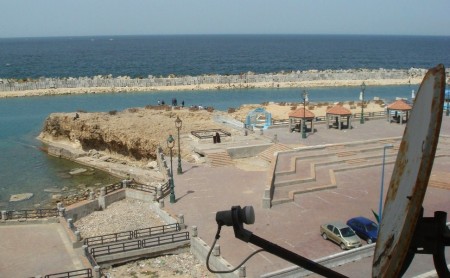
The first event of the day was my visit to the ruins of a former Roman bathhouse and what may have been part of a library. Perhaps not the famous ancient library, but the signposts on-site were quick to point out that there were definite outlines of podiums and theatre seating, arranged in a series of small rooms that would have been perfect for lectures and discussions. Showing that the ancient Romans occupying Alexandria were not entirely about studying, the nearby bathhouses contained decadent mosaic tile patterns of gods, birds, and wild animals frolicking about in jungles. My guide to this small area, called the “Villa of the Birds,” was a young Alexandrian archeology student who was pleased to have a chance to practice her English and refused my attempts to tip her. “It’s my job to study these ruins and I enjoy talking about my work. As a teacher I’m sure you understand!” she reminded me. The police officer patrolling the ruins needed a few pounds of bakhsheesh after he took me by the arm, led me to a wall, pointed to it and said “This…Roman wall,” then quickly extended his palm. The difference between the two “tours” and expectations from them were strikingly ironic, as is the sorry state of what Mubarak apparently pays his military/police.
I was running out of time, as I didn’t trust my taxi bargaining ability, the tram was unbearably slow (I could literally outpace it walking, but what do you expect for the equivalent of $.06?) and I didn’t know my way around the city. But I certainly wanted to see the opposite of the city’s antique marvels, in the form of Bibliotheca Alexandria, a massive silvery building in the shape of a half-buried disk with runes and hieroglyphs etched onto the sides.
I decided to try out the city serveecee system, large white vans that careen around the streets of larger cities in Egypt. We have a similar system in Jordan, but only with regular small 4-seater cars. Being a foreigner inside these vans is an interesting experience. Each passenger moves like well oiled clockwork, but I am the new and strange gear in the machine; just a few ticks behind the rest. A passenger enters, the others fold up the seats to allow entrance. The passenger proffers the fare, with or without exact change, and it’s passed forward to the driver through a sea of willing hands. Almost always, one passenger, usually a young bespectacled student with a thick beard, takes it upon himself to calculate fares per person, distribute change backwards into our midst, and then pass the full amount forward to aid the driver who’s busy trying to keep us alive in the busy Corniche boardwalk street traffic. Watching them in action is incredible. I sit near the back so I don’t interrupt their system like a clumsy water buffalo. You can fit 14 people on one of these microbuses and they make every centimeter of space count, packing us in like sardines. But no one seems to mind. It’s how Egypt is. Everyone knows the system and knows the part they have to play in order for it to move smoothly, both in Egypt as a whole and here in this micro-culture of the micro-bus. In only a few minutes and for a half pound, I found myself gently but politely shoved out the door in front of the library, a curl of smoke from the departing bus ringing my head.
This new library was an absolute joy to visit for a couple reasons. First, because of its grand vaulted inner reading room that was literally the size of a football field, and secondly because I was thrilled to see that the exhibits and and carvings from the unavailable Greco-Roman Museum had been moved here into a small museum in the library’s basement. I can’t praise this place enough, and although I’m just putting in one of my favorite shots here, you can see the rest in my gallery on Egypt in Flickr.
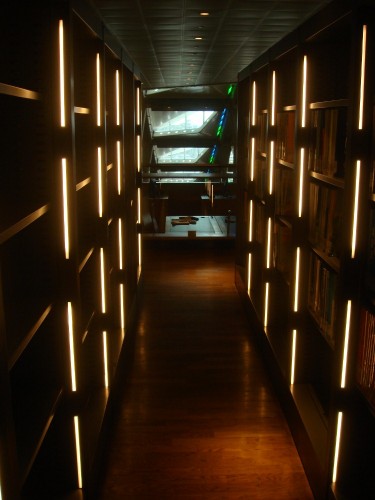
Beautifully accented bookshelves make you feel like you're inside the Jedi Council or something (nerd moment)
Downstairs in the basement, I paid an extra 20 pounds to bring in my camera on top of the 10 pound regular admission, but the expert organization, lighting, and descriptions on these exhibits was worth it. That was one of my greatest complaints in regard to the Egyptian Museum in Cairo – terrible, mistranslated descriptions and horrible or almost nonexistent lighting. The library’s museum, however, was a testament to the completeness of its modernity; it wasn’t merely a shimmering external facade. Between the monolithic outside, the vaulted and muted greens and blues of the vaulted inside, and now this modern and international museum, I felt as if I was in New York, Paris, or London.
With only half an hour remaining before my train would leave, I knew I had to tear myself away from these exhibits, pick up my large luggage bag from the apartment, and get to the station. There was no time to figure out where the serveecee buses were going; I risked a taxi and found my driver, Mahmoud, to be a pleasant and cheerful fellow who wove expertly through the after-work traffic to get me to the station a whole five minutes ahead of the train’s arrival. I tipped him an extra 10 pounds for his speed and affable personality, for which he gratefully carried all my luggage to the train’s gate! I had to chuckle when I thought of how little I’d used my Lonely Planet guidebook the past couple days – but if I’d stuck to the book, I’d have missed out on meeting the movie-buff kids and my two walking companions. I guess I can resolve from now on to “strike out” a little more than I usually would!
Now, my seat-mate is snoring slightly, but the music roaring from the headphones tucked into his ears is loud enough that there’s no way I’ll be able to sleep next to him. I think I’ll read a little bit of my book, Seven Pillars of Wisdom by T.E. Lawrence, that my parents got me for Christmas. Should be interesting to read about one of the most famous foreigners to ever inhabit Jordan!
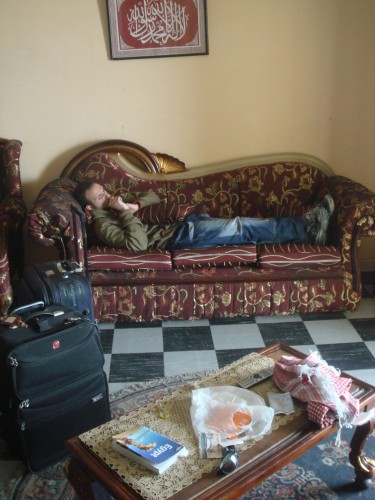
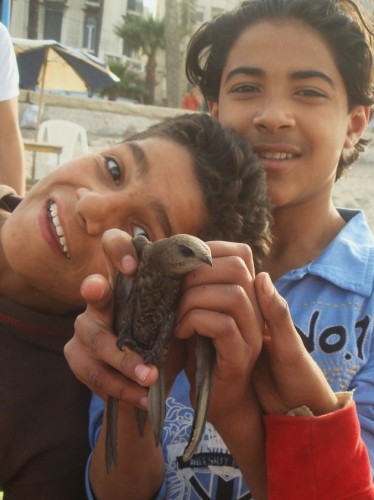
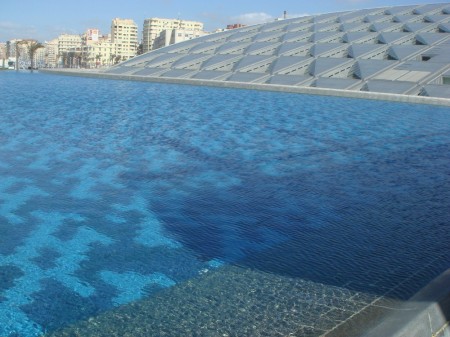


oh zach I had to admit I couldn’t stop laughing at ur comments!!! guy u describe things better than they are. but really the best part was ur “Fishlike train” 🙂
can’t wait to read the other parts